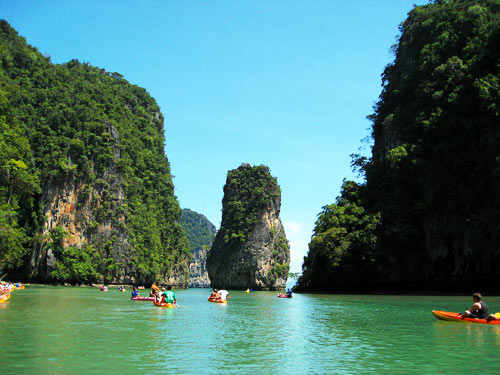As an eco- traveller it is your responsibility to prevent or minimise any negative impacts on the environment, local community and economy of the destination you are visiting. Our aim is to provide guidelines that will help you to remember the principles of ecotourism throughout your trip.
Before you go
- Choose your travel provider on the basis of their eco principles and practices.
- Educate yourself about the destination you are visiting by reading guidebooks and travel articles.
- Be aware of local history, culture and customs of the locals before arriving.
- Learn enough knowledge of the language to be polite i.e. hello, please and thank you. By making the effort to learn even the basics it will be appreciated by locals; and enrich your experience.
- When packing, if you want to bring gifts for local people in developing countries don't give sweets; instead bring clothes and pens, and ask your tour operator or driver to give them to community elders so that you don't encourage begging from children.
- Learn about the vital eco-systems before arriving.
During your Stay
- Be sensitive to the local culture by wearing clothing that is accepted.
- Be aware of people's sensitivity to being photographed; always ask first.
- Observe local customs.
Remember that you are a visitor and therefore be aware that your cultural values may differ from those of the locals. This may include different concepts of time, personal space, communication etc. which are not wrong or inferior, just different. - Demonstrate responsible behaviour to other travellers who are less informed than you by acting as an example.
- Use local transportation, guides, inns, restaurants and markets to benefit the local economy.
- Be sensitive to displays of wealth in front of people from developing countries. By displaying possessions such as cameras and jewellery, feelings of jealousy may be created which then generates barriers that inhibit genuine interactions between travellers and locals.
- Ask your tour operator or guide what their established environmental guidelines are for limiting and improving tourist impact on the environment and local culture. General guidelines involve staying on trails, maintaining set distances away from wildlife, and not encouraging drivers to move too close to wildlife, even if it is tempting for getting a better picture.
- Comply with international environmental conventions. Do not buy any animal products while travelling. Do not remove any objects, plants or animal products from nature. Not only can these affect fragile ecosystems, but is also illegal.
- Conserve Resources. Be aware of resource shortages such as water and food as many tourist destinations are under increasing pressure.
- Don't allow your guide to hunt endangered or threatened species or harvest rare plants for your consumption.
- Encourage practices to conserve the environment, including the use of renewable resources in a sustainable manner and the conservation of non-renewable resources.
On return
Continue with your commitment to conservation at home by incorporating it into everyday life. Support organisations or societies that follow eco-principles and share your experiences with others with the goal of increasing awareness of environmental issues.
Conclusion
These recommended guidelines should be followed by all eco-travellers. However by choosing a tour operator through EcoTour Directory, a small part of the work has been done for you as the eco-policies of every listed operator has already been reviewed; and is displayed for you to read about.
By encouraging the tourism industry to comply with these policies on a local, regional and national level the aim is to restructure the tourism industry into making a positive impact towards environmental sustainability, economic sustainability for all stakeholders and the preservation of culture. By choosing only travel providers that hold eco-principles, the rest of the tourism industry will be forced to follow due to the power of consumer demand.


